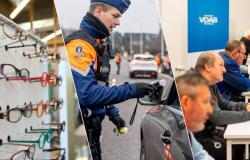Brussels must intervene immediately to prevent further decline of the European car industry. Immediate action is needed to accelerate the necessary eco-system for electric cars. Without measures, the gap with China and the US will increase further, with serious consequences for the European economy (export, employment, innovation). That states credit insurer Allianz Trade in the recently published ‘Global auto outlook’.
Allianz Trade states that the transition to electric driving is turbulent due to geopolitical tensions, slowing demand and regulatory uncertainties. ‘There are big differences regionally. China is challenging traditional auto leaders. Europe and the US, wary of Chinese dependence and the impact on their own auto industries, are responding by raising trade barriers and extra surveillance.’ The report then zooms in on specific regional details.
China is wringing out European carmakers
Allianz Trade paints a bleak future for European car manufacturers (with Germany in the lead). Johan Geeroms, Director Risk Underwriting Benelux: “The disruptive role of China is crucial. Especially in the field of electric vehicles. They are miles ahead. This has a dramatic impact on European automakers who have waited too long. Of course, everything is happening to catch up. But especially when it comes to the mass market of affordable mid-range cars, European manufacturers face a cutthroat competition. That means lower prices and tight margins. Those left behind will struggle to survive. We are already seeing rising bankruptcies in the automotive sector. Not only are the margins wider at Chinese car manufacturers, they also have a much longer shelf life. That’s not surprising; Chinese car manufacturers are purely state-owned enterprises. These force European manufacturers to produce at a loss. You can never keep that up for long.”
Fragmented stimulation
From 2035, the sale of new petrol and diesel cars will be banned in the EU. Geeroms: “What is the opposite of this? Look at the US and especially China: there you see coordinated support and a comprehensive strategy. 15 years ago, the Chinese government fully focused on EV, including large battery factories. Europe will not get any further than some piecemeal stimulus measures. In 20 EU countries there is a lack of infrastructure incentives (such as subsidies on charging stations and charging stations). Very little is being done to promote the acceptance of electric cars. And what happens in terms of stimulation will be further scaled back in 2024, such as in Germany and France where subsidies are limited by budget restrictions.”
Additional incentives needed
Geeroms gives some examples of how policymakers can help the European car industry. “Buyers will continue to hesitate if you do not address concerns about the range of electric cars. The distribution of charging stations is uneven within the EU. 60% of all European charging stations are located in three countries: the Netherlands, Germany and France. There needs to be much more support at a European level to increase that charging density. And so more incentives are needed to encourage the switch to electric driving.”
Batteries
According to Geeroms, support measures are also needed in the field of battery and software technology. “There is a decisive shift in the automotive industry from engine power to battery and software options. China is supreme in this area. Batteries represent the largest cost item in the production of an electric car, say 40% of the total costs. Six of the world’s ten largest battery manufacturers are based in China, while the remaining four are also in Asia. The dependence on this is dangerously high. In response, governments have tightened restrictions and controls on Chinese auto imports. For example, Biden’s Inflation Reaction Act (IRA) offers up to $7,500 in tax credits for the purchase of new electric vehicles, but excludes those with Chinese components.”
Backbone of European economy
According to Allianz Trade, the car industry has always been the backbone of the European economy. ‘The sector accounts for 6% of total production in the EU. With almost 950,000 companies, the automotive industry employs 6.5 million people. As an innovation hub, the sector is also the largest investor in research & development in the EU (almost €73 billion in 2022).
Tags: support Brussels supporting role remains European car industry






